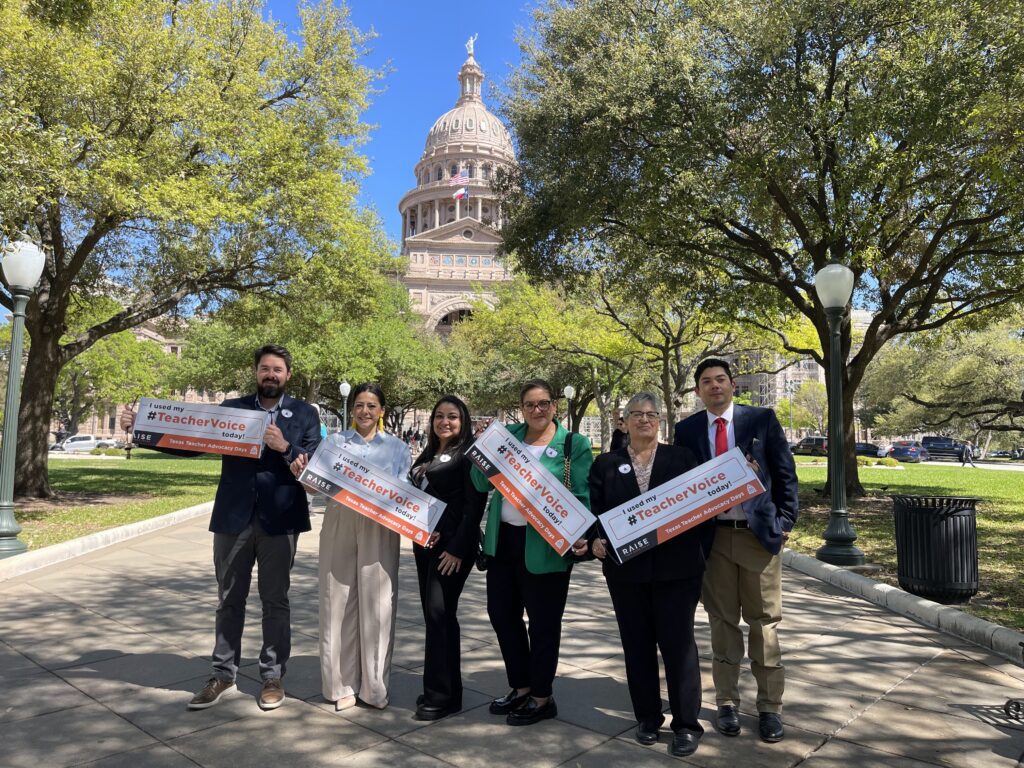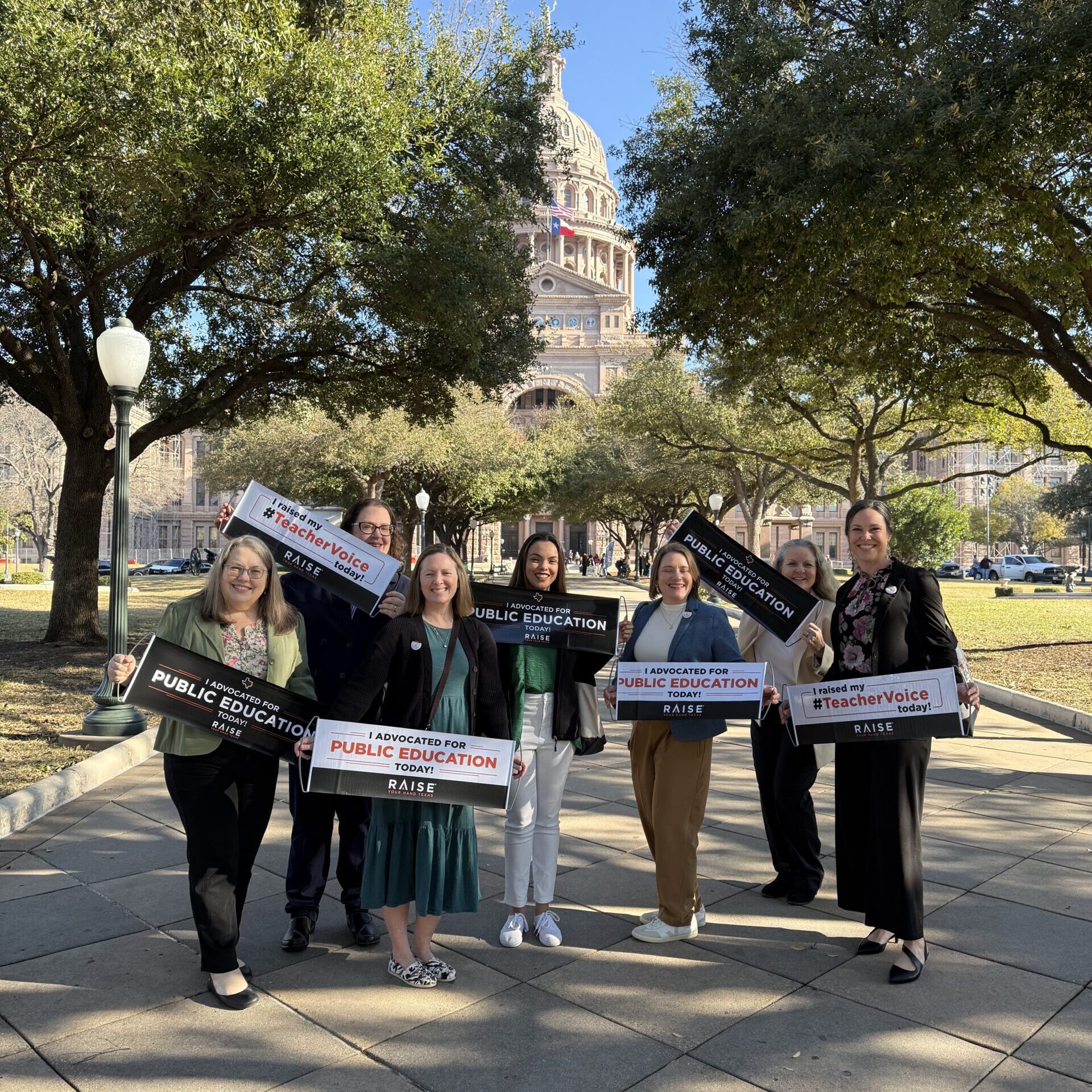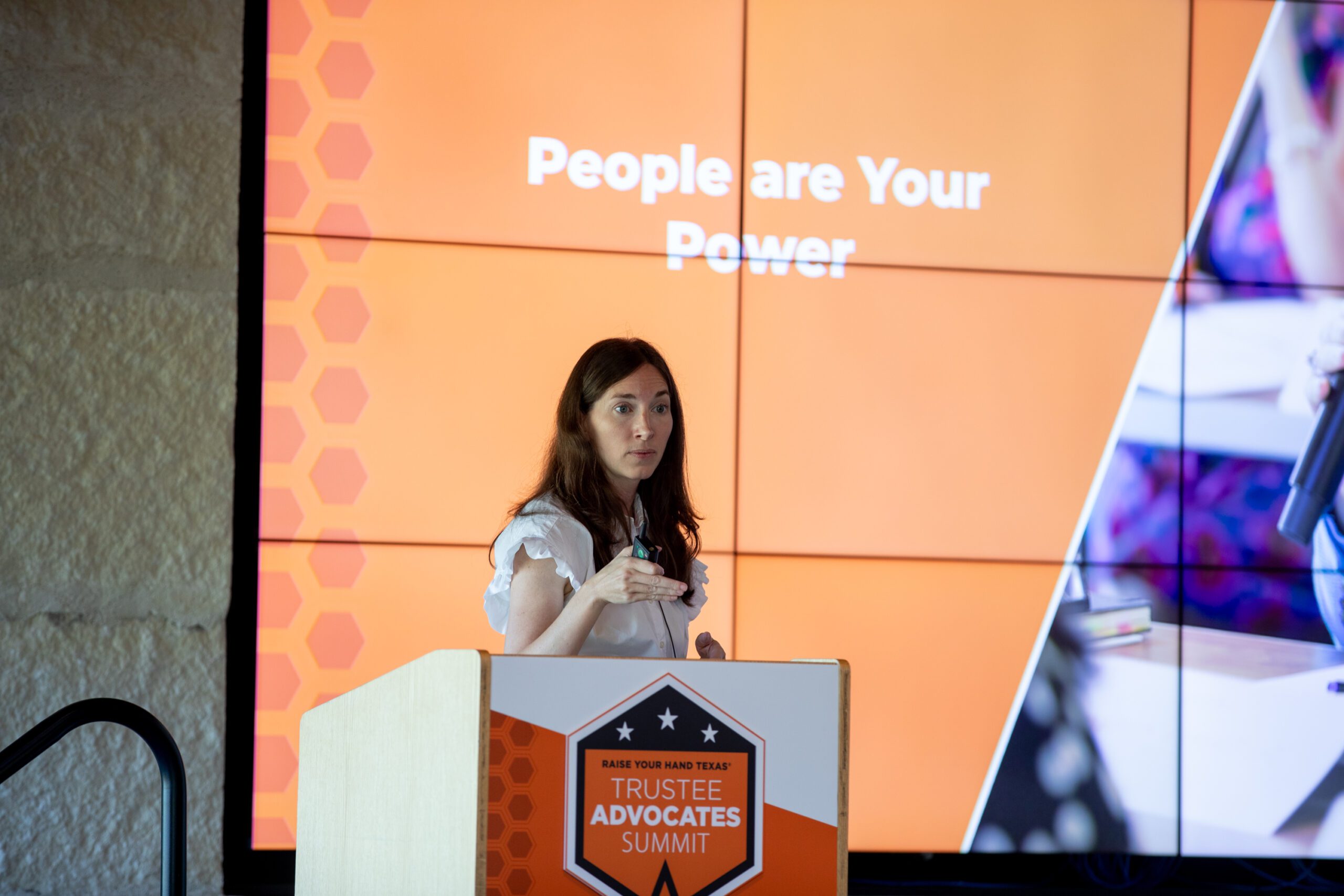
categories
Texas Teachers: Getting to Know Texas Lawmakers

April 26, 2023
How Teacher Advocates Learn to Effectively Connect with Texas Legislators
“Now when legislators think of teachers, they’re not going to think of the abstract, or think of the teacher they had in high school. They’re going to think of you, of the professionals who visited them and shared their experiences with them. Your voice matters.”
This is what JoLisa Hoover, teacher specialist at Raise Your Hand Texas, told a group of teacher advocates who visited the State Capitol this spring. The teachers from Colin County shared how the process of visiting elected officials to tell their stories changed their perspectives and motivated them as professionals. Courtney Lopez, a math specialist from Denton ISD, said, “Teacher voices are important, and taking time to meet with legislators face-to-face to listen, ask questions, and share can have an impact on shaping policy.”

We asked teacher participants to sum up in one word what they felt as a result of their Teacher Advocacy Days experience, and their words tell a powerful advocacy story. Our hope is these powerful feelings spread and encourage more educators across the state to share their stories and take an active role in strengthening public education for all Texas students.
Advocacy in Action
The concept of connecting legislators with stories from the classroom has resonated with many teachers who have participated in Raise Your Hand Texas’ Teacher Advocacy Days. To date, more than 55 teachers from across the state, with leadership from Hoover and the organization’s Regional Advocacy Directors, have visited state legislators and advocated for public education by sharing their stories and expertise as Texas public school educators.
The teachers who traveled from across the state shared stories that gave legislators heartfelt, tangible examples of what it is like to lead a Texas classroom, and what teachers face as they educate their share of the state’s 5.4 million public school students.
Overwhelmingly, educators have spoken about the need for significant teacher pay increases in order to retain current teachers and recruit new teachers. Other topics include:
- additional support staff, such as counselors, aides, and special education staff;
- filling vacant staffing positions; and
- the need for more mentoring in the teaching field.
According to the 2022 Charles Butt Foundation Texas Teacher Poll, 41% of teachers work additional jobs out of financial need outside of their school, in most cases, during the school year. The teachers visiting the Capitol made it clear the buying power of their salary has diminished as their pay stagnated and inflation rose.
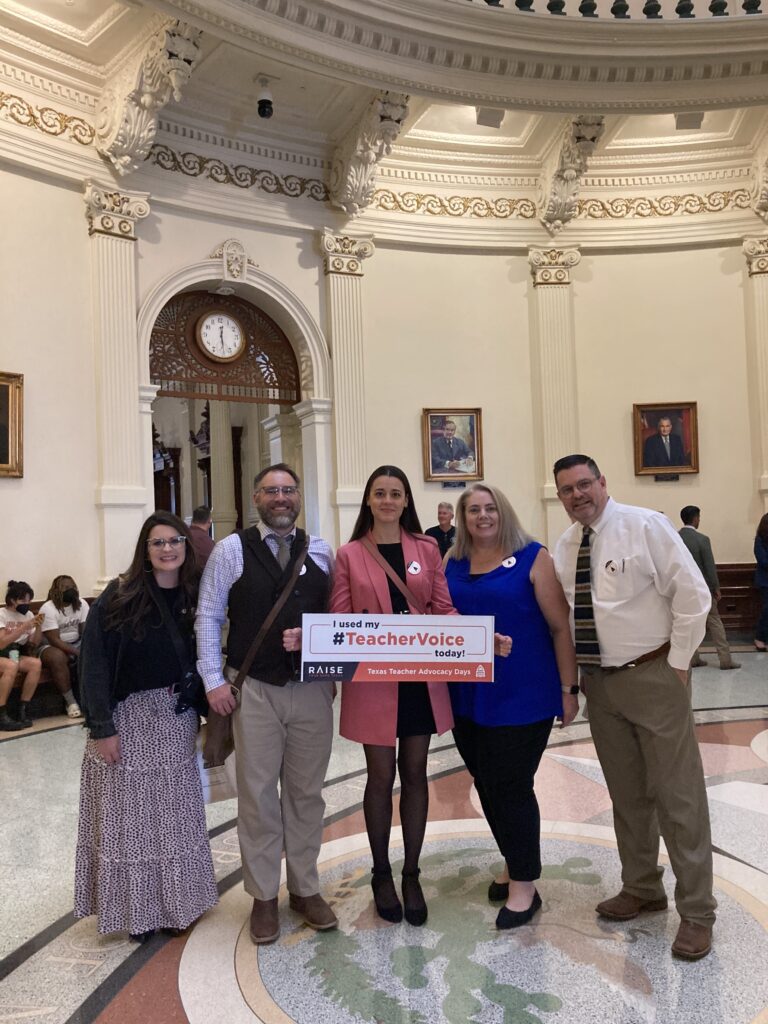
Teachers shared their personal stories of working second jobs and the stress of living paycheck-to-paycheck while working in a highly technical and demanding job. Several teachers shared stories about how the cost of a health procedure was actually more stressful than the medical diagnosis, and then went on to share stories of delaying health and mental care because it was unaffordable on their teacher salaries.
Teachers spoke about why their coworkers have left the profession and what they believe would keep more teachers from leaving the classroom. While many elements of the teacher workforce crisis were discussed, the need for a significant teacher pay increase was the solution most proposed by Texas teachers.
Barton Jacques, who teaches science in Killeen ISD and works both evenings and weekends tutoring as his second job, emphasized teachers need to share stories that highlight “your successes and your struggles with those who need to hear it.” Jaques shared how working a second job has allowed him to continue being a teacher, the profession he loves, but it has come at the cost of giving up many nights and weekend hours he could be spending with his family.
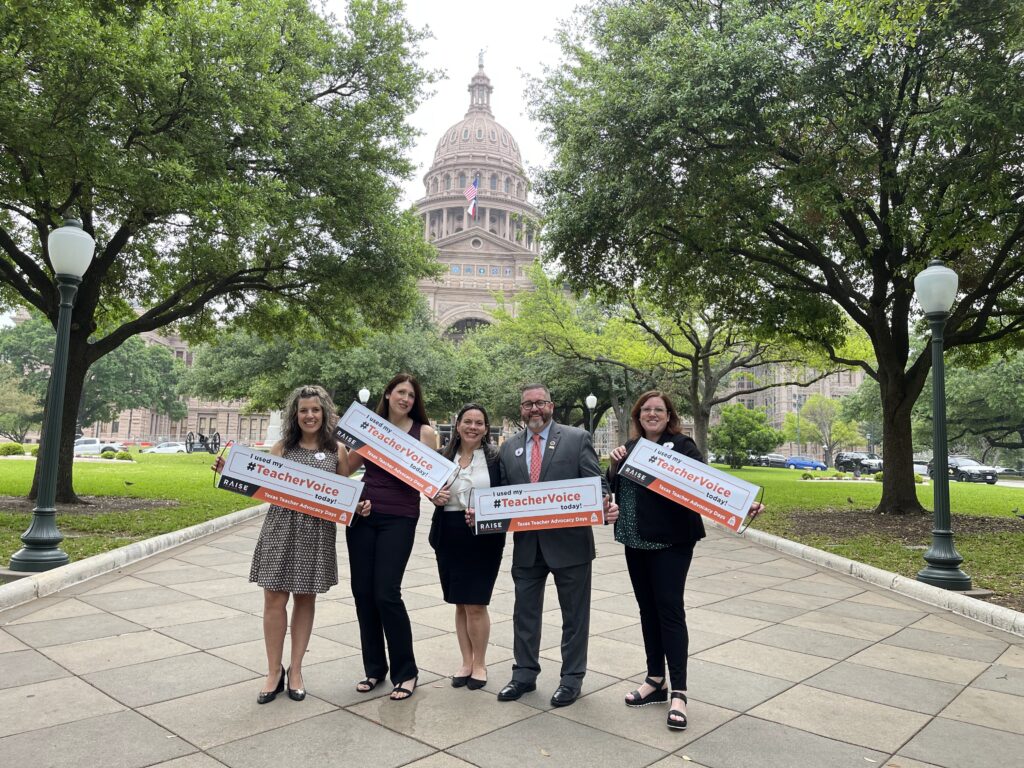
After finishing his Capitol visit, Jacques reflected on the experience and said, “Policy is made at the Capitol, but policy is truly implemented in our classrooms. Those at the Capitol need to know what it looks like when the rubber meets the road.”
Houston-area Lamar CISD teacher Becky Green shared her first-hand experiences teaching through COVID. “You can’t argue with a story,” she said. “It’s not political, it’s personal. It’s not about taking political positions, it’s about helping public school students.” Telling her personal story of vacant teaching positions and the stress that puts on staff and students, Green shared how many teachers may leave the profession due to the low salary and working conditions.
Damaris Gutierrez from Northside ISD reflected about the power of advocating with other educators. “Also to be in community with other educators, hearing their stories is important,” she said. “We’re not doing this alone and that helps us carry this work forward.” Damaris shared that high-stakes testing and low teacher compensation are reasons coworkers are leaving a profession they felt was both a calling and a dream job.

Denise Pena, also from Fabens ISD, agreed with her colleague about the importance of speaking up and said, “It’s not just an abstract, far-reaching concept. There are organizations willing to elevate teachers’ voices and representatives willing to listen.” Denise shared she is from a family of teachers, but the hours they spend teaching and working their second jobs have made a negative impact on her family, and she doesn’t feel she can recommend teaching as a profession due to the pay and workload.
Law Studies Teacher Jennifer Cassanova from San Antonio ISD emphasized the importance of using your voice to impact change and spreading that message to others. She said, “Do not hesitate to use your voice. I teach that to students but do not always take the time to practice what I teach. Your voice and story matter.” Jennifer is a Career & Technical Education (CTE) teacher who comes from a family of teachers, but shared she is considering leaving the profession because she is not able to continue to support her household and aging parent on a teacher’s salary.
So while teacher advocates appreciated the opportunity to use their voice and build their advocacy skills, the stories they shared reflect a profession in crisis. The teachers not only shared stories of struggle but also gave legislators feedback about what could strengthen the profession and keep teachers in the field. Now, as we near the last month of the 88th Texas Legislative Session, is the time for legislators to listen and act on behalf of Texas teachers.
